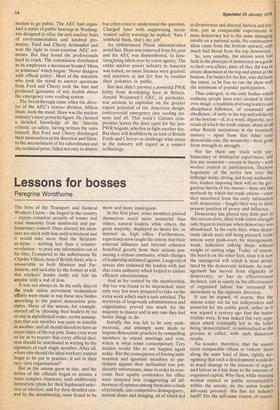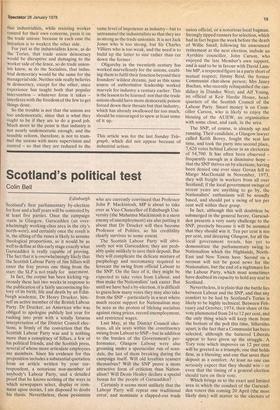Lessons for bosses
Peregrine Worsthorne
The boss of the Transport and General Workers Union — the largest in the country — enjoys complete security of tenure and total immunity from ministerial and parliamentary control. Once elected, his members are stuck with him until retirement and it would take more than the Serjeantat-Arms — nothing less than a counterrevolution — to prise any information out ol his files. Compared to the unfortunate Sit Charles Villiers, boss of British Steel, who is answerable to both Minister and Parliament, and sackable by the former at will, this workers' leader really can rule his empire with a rod of iron.
It was not always so. In the early days ol the trade union movement tremendous efforts were made to run these new bodies according to the purest democratic principles. Many of the unions, for example, started off by choosing their leaders by lot or else in alphabetical order, on the assumption that one member was quite as suitable as another, and all should therefore have an equal share of the top jobs. Some even went so far as to require that every official decision should be sanctioned in writing by the signature of each single member. After all, where else should the ideal workers' control begin to be put in practice, if not in their very own organisations?
But as the unions grew in size, and the duties of the officials began to assume a more complex character, such ambitiously democratic plans for their haphazard selection or election, and for their detailed control by the membership, were found to be more and more inadequate.
In the first place, some members proved themselves much more masterful than others, natural leaders, while others, the great majority, displayed no desire for, or interest in, high office. Furthermore, experience soon taught the unions that their external influence and internal cohesion benefited greatly from their actions possessing a certain continuity, which changes of leadership militated against. Longevity of tenure also endowed the leaders with just that extra authority which helped, to ensure efficient administration.
And as for control by the membership, this too was found to be impractical, since only very few were prepared to take on the extra work which such a task entailed. The mysteries of large-scale administration and organisation proved too much for the majority to master and in any case they had better things to do.
Initially this was felt to be very undemocratic, and attempts were made to impose democratic practices by compelling members to attend meetings and vote, which is what some contemporary Tory leaders would like to see happen again today. But the consequence of forcing uninterested and ignorant members to participate against their inclination was predictably unfortunate, since in order to overcome their apathy contenders for office were tempted into exaggerating all differences of opinion among them into a clash of principle, into competitive demagoguery, mutual abuse and slanging, all of which led to divisiveness and discord, faction and friction, just as comparable experiments in mass democracy led to the same damaging results on a national scale. No constructive ideas came from the bottom upward; only much bad blood from the top downward. So, very sensibly, the unions soon lost faith in the precepts of democracy as a guide to their own affairs, since all they did was to create dissension at the top and unrest at the bottom. Far better for the few, who did have the talent, to be free to run the show with the minimum of popular participation.
Thus emerged, in the only bodies which ordinary people have ever created in their own image, a tradition of strong leaders and disciplined followers, of command and obedience, of unity at the top and solidarity at the bottom — of, in a word, oligarchy, as a result of which the trade unions, alone of all other British institutions in the twentieth century — apart from that other nondemocratic one, the monarchy — have gone from strength to strength.
Not for them any truck with parliamentary or ministerial supervision; still less any nonsense — except in theory — with worker control or participation. Decisive hegemony of the active few over the lethargic many, strong, not to say authoritative, leaders imposing their will on the gregarious inertia of the masses — these are the methods by which the trade unions — once they recovered from the early infatuation with democracy — fought their way to their present position of power and influence. Democracy has played very little part in this success story, since trade union strength only began to increase when democracy was abandoned. In the early days, when democratic ideals were still being pursued, trade unions were push-overs for management, weak, indecisive talkih shops without weight or cutting edge. Today, of course, the boot is on the other foot, since it is now the managerial will which is most debilitated by the democratic sickness. As management has moved from oligarchy to democracy, so has its effectiveness declined, just as surely as the effectiveness of organised labour has increased by movement in the opposite direction. It can be argued, of course, that the unions today are far too independent and powerful for the public good, rather as it was argued a century ago that the industrialists were. It was indeed this very argument which eventually led to the latter being 'democratised', or nationalised as the process is called, with such disastrous results.
No wonder, therefore, that the unions resist comparable efforts to 'reform' them along the same kind of lines, rightly recognising that such a development would do as much damage to the interests of organised labour as it has done to the interests of organised capital. Why then, while resisting worker control or public accountability within the unions, do the union leaders advocate precisely this fate for industry itself? For the self-same reason, of course, that industrialists, while resisting worker control for their own concerns, press it on the trade unions: because in each case the intention is to weaken the other side.
For just as the industrialists know, as do the Tories, that trade union democracy would be disruptive and damaging to the worker side of the fence, so do trade unionists know, as do the Socialists, that industrial democracy would be the same for the managerial side. Neither side really believes in democracy, except for the other, since experience has taught both that popular intervention — whatever form it takes — interferes with the freedom of the few to get things done.
So the trouble is not that the unions are too undemocratic, since that is what they ought to be if they are to do a good job. Much more to the point is that industry is not nearly undemocratic enough, and the sensible reform, therefore, is not to trammel the unions with more supervision and control — so that they are reduced to the same level of impotence as industry — but to untrammel the industrialists so that they are as strong as the trade unionists. It is not Jack Jones who is too strong, but Sir Charles Villiers who is too weak, and the need is to build up the latter to size rather than cut down the former.
Oligarchy, in the twentieth century has worked marvellously for the unions, enabling them to fulfil their function beyond their founders' wildest dreams, just as this same source of authoritative leadership worked marvels for industry a century earlier. This is the lesson to be learned: not that the trade unions should have more democratic poison forced down their throats but that industry, which has already swallowed far too much, should be encouraged to spew at least some of it up,
This article was for the last Sunday Telegraph, which did not appear because of industrial action.



































 Previous page
Previous page